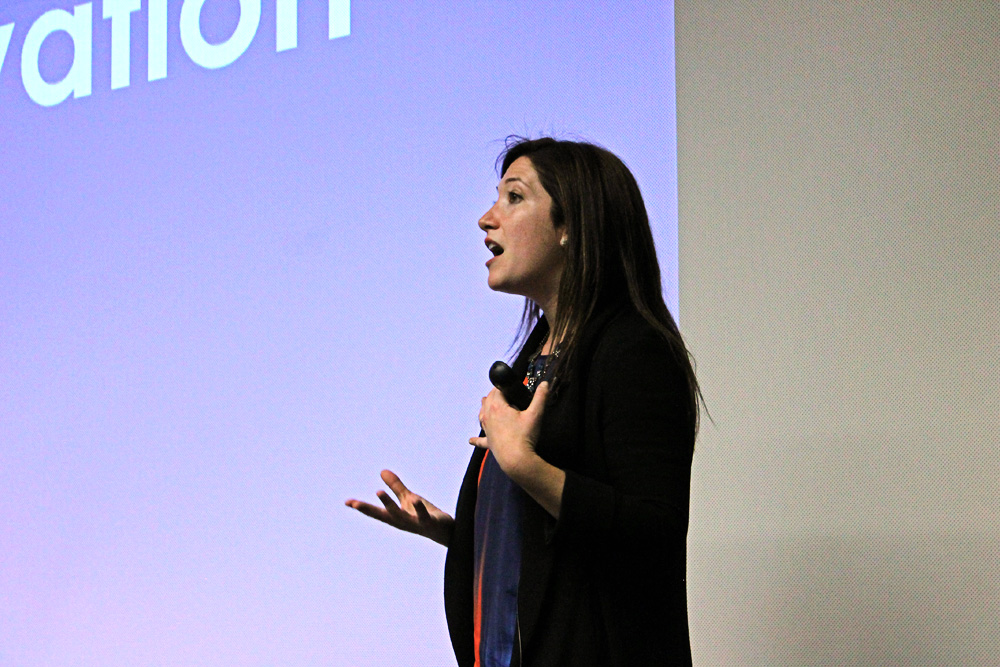
Randi Zuckerberg describes the impact that social media has on our society during her presentation on Monday in the Atlas auditorium. (Maddie Shumway/CU Independent)
Maybe you’re out on the town, having a few drinks with friends. Maybe your parents invited you to spend some rare, quality family time. You are in the midst of catching up when your phone buzzes. Is it a text? An email? A Facebook message? You can’t resist. You zone out from the conversation. Your attention wanders to your phone. We’ve all been there.
Eighty-one percent of Americans admit they regularly interrupt conversations, meals and playtime to check their text messages, emails or social media, according to researchers at the University of California, San Diego.
“The other 19 percent are lying,” said Randi Zuckerberg, who has devoted the last 10 years of her life and most of her professional career to coming up with the technology that has enabled today’s global connect-around-the-clock movement.
Zuckerberg?
Randi is the sister of Facebook founder Mark Zuckerberg. But she’s way more than just an attachment to a last name that resounds a modern myth.
Monday afternoon, the early Facebook executive, book author and tech-savvy queen of social media paid CU students a visit. Zuckerberg talked about the 10 years she has spent in Silicon Valley, the latest trends in technology and newly emerging career paths in a field that the now 31-year-old helped design and mold.
The hour-long talk in front of more than 150 students in the ATLAS Center was the first in this spring’s ATLAS Speaker Series.
“We are all marketers online, promoting our lives,” Zuckerberg said.
She pointed out strategies to use social media and modern technology to build future careers and fortunes. Calling online connections “the new currency,” Zuckerberg introduced contemporary developments in marketing. An example? The world’s first Instagram hotel recently opened its doors in Sydney. The knack: Guests don’t have to pay for their stay if they have more than 10,000 followers on the online photo-sharing network.
Zuckerberg also coined the term “maker movement,” quoting latest polls wherein one-third of American teenagers believe that they will invent something to sell online.
“Today, everyone can get paid for [his or her] passion project,” she said. Websites like the online marketplace 99designs or the web-based tutoring-service Codementor allow anyone with a specific skill to offer it to a global audience of potential buyers.
Randi Zuckerberg jumped on the social media-pioneering bandwagon early on. Fresh out of college, she moved to New York City, convinced that she would plunge into a career at a well-known advertising agency.
Then her brother called.
Mark Zuckerberg appointed Randi Facebook’s marketing executive in 2004. She writes about the launch of the social media phenomenon in her book, “Dot Complicated – Untangling our Wired Lives.” During Monday’s event, Zuckerberg gave away 100 free copies to students.
Three years into her new life in Silicon Valley, she created Facebook Live, an online television program available to the site’s users. Music artist Katy Perry announced her world tour during the project’s launch in 2007, cementing both her ticket sales and the new network’s reputation.
Only a couple of weeks later, White House staff called Zuckerberg, asking her to organize a virtual town hall meeting for then presidential candidate Barack Obama.
Back in 2007, Facebook Live introduced traditional television to an online mass audience. Today, Netflix wins Emmys with this winning combination.
In 2011, Zuckerberg resigned at Facebook to found her own company, Zuckerberg Media.
Although the rise of social media and new technologies paved her way to success, Zuckerberg is aware of the manifold consequences that digital progress brings along.
In her children’s book “Dot,” a tech-savvy young girl sets out to explore the real world that waits on the other side of the iPad and Facebook. With that book and her technology and lifestyle blog “Dot Complicated,” Zuckerberg, who has a two-year-old son, hopes to help educate a more conscious user of tomorrow.
The last trend she named Monday was digital detox – the decision to pull the plug every now and then – in a time when more and more people are becoming digital addicts.
“People are reclaiming their lives,” Zuckerberg said. They’re the lives she helped improve and influence.
For upcoming speakers at ATLAS, visit www.colorado.edu/atlas/speakerseries.
Contact CU Independent Copy Editor Lars Gesing at Lars.gesing@colorado.edu.
